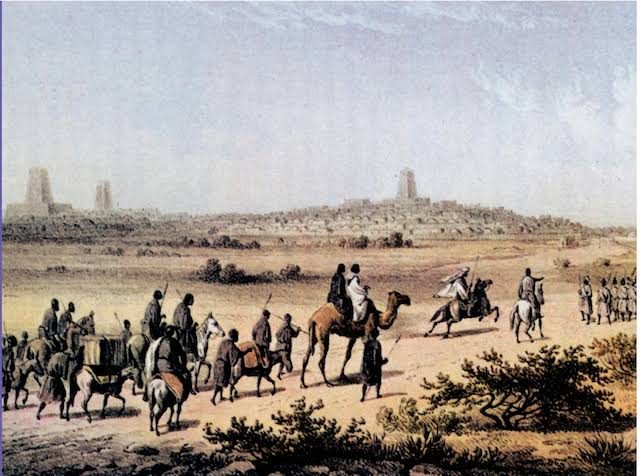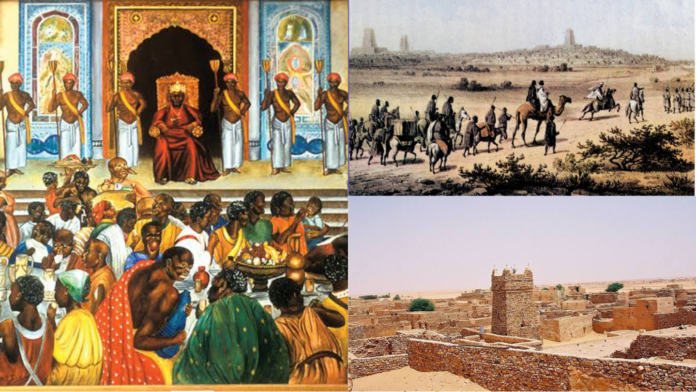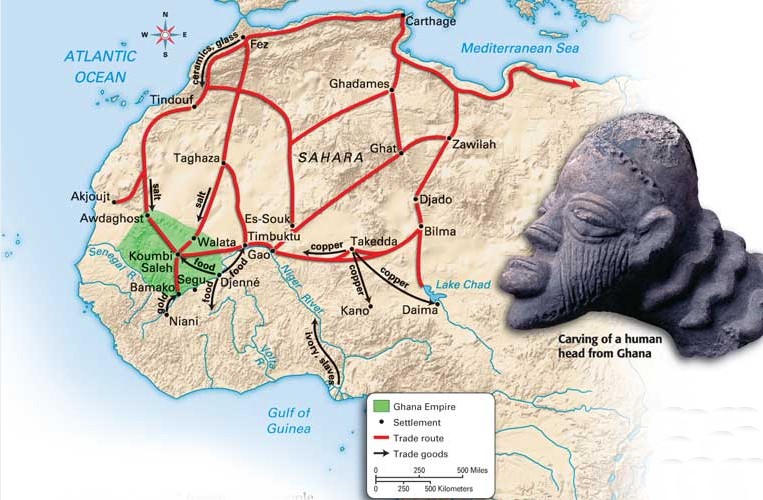In the Middle Ages, the tales about the land of gold in Africa spread throughout Europe. Arab merchants talked about the Wagadu Empire, known also as the Ghana Empire.
One of the main gold producers in Africa was the Wagadu Empire, also known as the Ghana Empire. The king owned all of the gold. Every golden nugget weighing between 25 grams and half a kilogram belonged to the king.
The present-day Republic of Ghana got its name from the ancient Ghana Empire. The modern country of Ghana, on the other hand, it is located far from the former empires territory.
Modern-day Mauritania, Senegal, and Mali were all parts of the Wagadu Empire.
Between the 4th and 11th centuries, the Wagadu Empire flourished, and its rulers were known as Ghana warrior kings. That is why the Ghana Empire was know to that name by Arab merchants.
The king served his subjects 10,000 meals a day. He used to ride around the city in the mornings, settling conflicts between his people.
Koumbi Saleh, the empire;s capital, consisted of two cities and had a population of 15.000 people. Wagadu people lived in the first city, while Arab and Berber merchants lived in the second city.
Wagadu’s people mastered iron and used it to create strong tools and weapons. Since they could turn fire and earth into iron, blacksmiths were known as magicians. The Wagadu army had an advantage over their enemies because they used iron weapons.
The Wagadu Empire had a standing army of 200.000 warriors, including 40.000 archers, when it reached its height around 1000AD.
The Wagadu Empire had a standing army of 200.000 warriors, including 40.000 archers, when it reached its height around 1000AD
Monopoly on the trade with gold and salt
The Wagadu Empire was Western Africa’s first trading empire.

Transportation was supported by the presence of large rivers. The Gambia River, the Senegal River, and the Niger River were the three rivers used.
Before camels were introduced, trade across the Sahara desert was extremely difficult. Merchants could load up on goods and trade across the Sahara which was later much more easy with camels. Their trade collapsed due to that.
The kingdom stood at the crossroads of major trading routes. Salt came from the north, and gold and ivory came from the south, owing to Arab and Berber traders.
The Wagadu people used silent barter because of language barriers. Merchants were able to agree on a trading price using this approach
Traders decided to meet at a certain place to conduct the silent barter. At the spot, one group of traders would give trading goods such as salt or ivory. They would then step away and play drums to signal the arrival of another group.
The other traders would then approach the goods and place a certain amount of gold alongside them. After that, the first group of traders would return. They would take the gold and leave if they decided on the number. If that wasn’t the case, they’d leave and wait for the second party to add more gold.
Both parties were absolutely frank. They didn’t touch any gold or commodities until they had reached an agreement on a price.
The fall of the Wagadu Empire
The fall of this wealthy empire was influenced by a wide range of factors.
Trade routes changed, and new ones emerged further east. In addition, in modern-day Guinea, larger gold mines started to operate. The Wagadu Empire lost its trade and gold control as a result of these reforms.
Overpopulation caused pastures to transform into a desert. There was less food because there was less arable land available. Food shortages were worsened by a series of droughts in the eleventh century.
The Wagadu Empire was invaded by the Almoravids, a northern Berber dynasty, in 1076. The Wagadu Kingdom came to an end with this. Islamic expansion in Sub-Saharan Africa was aided by the Almoravid invasion
The Wagadu Empire was replaced by the brief kingdom of Sosso (1180–1235). The prominent Mali Empire ruled the entire region by 1240
Each area of the world has experienced periods of prosperity and success throughout history. Western Africa was much more established throughout the Middle Ages. Misery, suffering, and inequality did not exist in Western Africa at the height of the Wagadu Empire
Any empire that grows must also fall, according to history. The fall season brings with it ruins and tales.
Despite the fact that the two states share no territory, the modern nation of Ghana is named after the ancient Empire of Ghana.
Source : The African History



